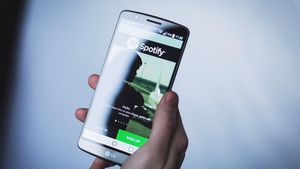JAKARTA - Spotify Technology SA on Monday, June 13 announced that it has established a Security Advisory Board to provide third-party input on issues such as hate speech, disinformation, extremism and online abuse.
The group represents another step in Spotify's efforts to tackle malicious content on its audio streaming service after a backlash earlier this year over "The Joe Rogan Experience," in which podcasters were accused of spreading misinformation about COVID-19.
The 18 experts, which include representatives from the Washington, DC civil rights group Center for Democracy & Technology, the University of Gothenburg in Sweden and the Institute of Technology and Society in Brazil, will advise Spotify as it develops products and policies and thinks about emerging issues.
"The idea is to bring these world-renowned experts, many of whom have been in this space for several years, to build a relationship with them," said Dustee Jenkins, Spotify's global head of public affairs.
“To make sure that it doesn't talk to them when we're in the middle of a situation… Instead, we meet with them on a fairly regular basis, so we can be much more proactive about how we think about these issues across the company,” Jenkins added.
VOIR éGALEMENT:
This board is purely advisory in nature, and Spotify can accept or reject its suggestions. Unlike Facebook's supervisory board, which decides what cases are reviewed, Spotify will raise issues for the board's consideration and provide feedback.
Many participants, such as Kinzen founders Mark Little and Aine Kerr, have consulted Spotify. Some, like Ronaldo Lemos, who was instrumental in creating Brazil's Internet Rights Act, provide regional expertise.
Sarah Hoyle, Spotify's head of trust and security, said the advisory board was not formed in reaction to "a specific creator or situation," but rather an acknowledgment of the challenges of operating a global service at a time when threats continue to evolve.
“How do we leverage the in-house expertise we already have at Spotify, to take advantage of these people whose life's work has learned this, and they are in markets around the world, just like our users, like we creators,” said Hoyle.
The English, Chinese, Japanese, Arabic, and French versions are automatically generated by the AI. So there may still be inaccuracies in translating, please always see Indonesian as our main language. (system supported by DigitalSiber.id)


















